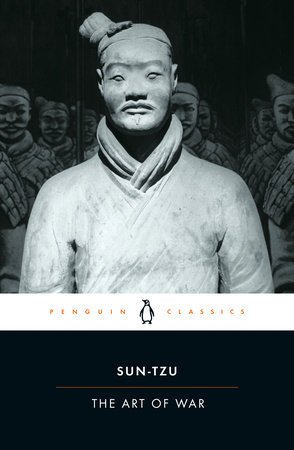. . . . I have not posted since the penultimate day of July. My goodness time does fly when busy with the present, including friends with medical emergencies, and planning the future, of which there is a lot of planning as so much travel is involved, from New Orleans and Texas, to the Caribbean, to Europe -- and lordessa save us, Abu Dahbi.
I have been reading some very interesting books, though, such as this Penguin edition of The Art of War: The Essential Translation of the Classic Book of Life (2009) by Sun=Tzu; Introduction by John Minford; Edited by John Minford; Translated by John Minford.
This edition was chosen because of the Introduction provides historical context and because the editor/translator has included extensive Commentary on the chapters by a variety of Chinese scholars and generals past and present.
These are the chapters of the bare text:
Chapter 1: Making of Plans
Chapter 2: Waging of War
Chapter 3: Strategic Offensive
Chapter 4: Forms and Dispositions
Chapter 5: Potential Energy
Chapter 6: Empty and Full
Chapter 7: The Fray
Chapter 8: The Nine Changes
Chapter 9: On the March
Chapter 10: Forms of Terrain
Chapter 11: The Nine Kinds of Ground
Chapter 12: Attack by Fire
Chapter 13: Espionage
Last night I watched the Battle of Crecy episode from the television adaptation (2012) of the 14th century historical fiction doorstop, World Without End, by Ken Follett (no one loves rape and humiliation and degradation of women as much as he, not even GRRM).
I kept checking off the aspects of King Edward's plans for Crecy against Sun Tzh's instruction. It included everything Sun Tzu admonishes, about, including when to do or not to do a forced march. I was quite impressed. But then one sees how much all successful historical generals such Caesar, Napoleon and Grant follow his guidelines too, whether they did so consciously or not. The most important aspect evidently is speed of action, because Sun Tzu brings it up often, in more than one section of his advice. One has noticed that most successful commanders before mechanized warfare and air warfare has rapid movement in common.
I could not help but compare and contrast Grant and Lee with Sun Tzu instructions -- and how Lee in so many ways did not adhere to the Sun Tzu exhortations, while Grant always did.
Clausewitz had read Sun Tzu it is said. So might have Grant, though he never mentions it. Napoleon is widely thought to have carried the books with him everywhere. The first western translation of The Art of War was 1782, by a Jesuit priest, into French.
Why, since I have read Clausewitz, why had I not read The Art of War? It's so short too, quite unlike Clausewitz. But then, Clausewitz, though seemingly permeated with Sun-Tzu, is also Enlightenment in his approaches (which tends to really make him mostly out-of-date, experts say, for 19th and 20th century warfare -- what about 21st C warfare?), whereas, as mentioned, Sun-Tzh, who may well be the same sort of composite figure as Homer, is for the ages. Though warfare by plane, drone and intercontinental missiles changes everything, doesn't it?
The Art of War, though so short, may actually be even more dense than Clausewitz, since so much is couched in metaphor that we (well, at least me) of our place and age are not able to quickly and easily penetrate and grasp.
But I do recall how Grant is / was universally praised for the brevity and clarity of his battlefield plans and orders.
Now I'm thinking of The Art of War in terms of the battles of Saratoga, since as of tomorrow we're on a jaunt with a friend to visit a Postmambo Traveler amigo who lives there. My two objectives for our mini vacay is to visit the ground where Benedict Arnold pulled the Continental Congress and the as yet unborn nation's chestnuts out of the British military fire, was dreadfully injured, but allowed the French to come in who really pulled the US chestnuts out of the fire -- and then that nasty piece of work, General Gates, stole all the credit for himself, when he earned none -- sulking the whole time in his tent.
After that I'm going to take the tour of the cottage where Grant finished his Memoirs of the Mexican American War and the War of the Rebellion, one of the greatest works of military history, as great as Julius Caesar's War Commentaries on his Gallic Wars, and one of the United States great works of literature.
I'll probably look at some horses too, and who knows what else? There's no dearth of things to do and see in Saratoga.
Subscribe to:
Post Comments (Atom)






No comments:
Post a Comment